LOWER DIR, Pakistan: Siraj-ul-Haq, chief of a prominent Pakistani religious political party, has said free and fair elections were the “only way forward” as the South Asian country grapples with economic and political crisis amid a sharp rise in militant attacks.
Haq leads the Jamaat-e-Islami (JI), the Pakistani successor to the Jamaat-e-Islami founded in colonial India in 1941 by Abul Ala Maududi, a religious scholar best known for advocating an Islamic state in which the affairs of the government could be run under Sharia law.
While the JI has never formed a government in Pakistan itself, it was part of the Muttahida Majlis-e-Amal (MMA) and Pakistan Tehreek-e-Insaf (PTI) coalition governments in the country’s northwestern Khyber Pakhtunkhwa province in 2002 and 2013 respectively.
Now, as the party holds rallies in the run-up to elections, its leader said JI’s stance was that transparent polls were “the only way forward to improve the law-and-order situation, fix the economy and to end unrest.”
“If the elections were made controversial or if they could not be fair, then the incoming government will also not be able to continue, will be weak, there will be fights, arguments and unrest,” Haq told Arab News in an interview this week. “For a smooth political environment, it is important to hold a fair election.”
At the moment, however, Haq said there was “political suffocation,” demanding fair competition in elections for all parties.
“Our demand is that the judiciary, election commission and the [military] establishment have the obligation to provide an equal political environment to all,” the JI leader added.
His comments come amid allegations by jailed former Prime Minister Imran Khan and his party of a military-led crackdown that aims to keep them out of elections. The army denies it interferes in political affairs.
Pakistan is also headed to elections as it treads a tricky path to economic recovery under a caretaker setup after narrowly avoiding a default last year thanks to a last-gasp $3 billion International Monetary Fund (IMF) bailout package. Attacks by militants, particularly the Pakistani Taliban as well as separatists, are on the rise, while Pakistan’s ties with all its neighbors are currently strained.
Haq blamed Pakistan’s litany of problems on its political parties and its history of military rule, saying both civilian and army-led governments had not delivered.
“The circumstances are bad because of bad governance. So when you say there is unrest, so the unrest is due to these political leaders who strengthened themselves or their families, [but] didn’t strengthen the institutions, didn’t make the courts independent, didn’t improve the accountability system, and didn’t ensure the circulation of money [distribution of wealth] either,” Haq said.
Asked about the military’s outsized role in Pakistan’s political past and present, Haq again blamed political parties.
“Actually, the reason behind the involvement of the establishment [in politics] is because political parties are not organized here, in fact there is a lack of [internal] democracy in them, they do not have merit themselves,” the JI leader said.
“There is a family monarchy and there is no democracy within the party either, then personal character and affairs are weakened. Due to this weak character, they always remain weak.”
Responding to a questioning about his party’s position on the Pakistani Taliban (TTP), Haq said the JI did not support any group attempting to control the “government through arms.”
In the past, critics have accused the JI of sympathizing with the TTP and other religiously motivated militant groups.
“The way of preaching is open and the doors of reaching to power through elections are open and if one has a good narrative, present it before the people and come to power through the vote and support of people,” Haq said. “We don’t agree with any activity which is based on force, arms and terror.”
Religious party chief says fair elections ‘only way forward’ in Pakistani political, economic quagmire
https://arab.news/rtspv
Religious party chief says fair elections ‘only way forward’ in Pakistani political, economic quagmire
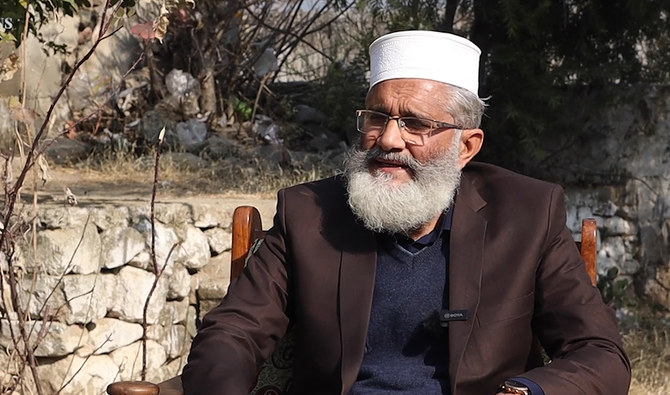
- Siraj-ul-Haq says judiciary, polls regulator, military establishment obligated to ensure fair competition in elections
- Blames weak, internally undemocratic political parties for outsized role of military in Pakistan’s political past and present
Pakistan’s foreign reserves with central bank surge past $9 billion after IMF inflows
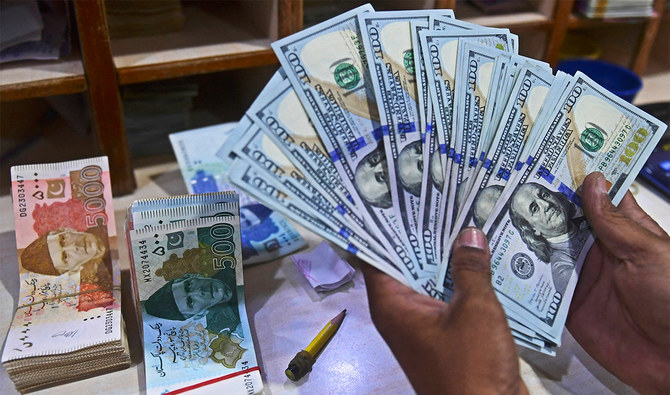
- Pakistan last month received $1.1 billion from IMF as final tranche of its $3 billion loan program
- Talks between IMF and Pakistan for a fresh loan program is expected to be held this month
KARACHI: Pakistan’s foreign exchange reserves with its central bank surged to $9.12 billion on Thursday, data from the State Bank of Pakistan (SBP) after Islamabad received the final tranche of $1.1 billion from the International Monetary Fund (IMF) last month.
The SBP confirmed on April 30 that Pakistan had received the final tranche of $1.1 billion as part of a $3 billion IMF loan program it entered last summer.
The South Asian country is expected to hold discussions this month with an IMF mission for a “larger and longer” program that Islamabad hopes would help avert its macroeconomic crisis.
“Foreign reserves held by the State Bank of Pakistan total $ 9,120.3 million,” the SBP said in a statement. It added that total reserves held by the country stood at $ 14,458.9 million, out of which net foreign reserves worth $ 5,338.6 million were by commercial banks.
Pakistan has been struggling with a chronic economic crisis since April 2022 that has seen its foreign exchange reserves plummet to historic lows and its national currency depreciate significantly against the US dollar.
The South Asian country has turned to international financial institutions and multilateral partners to secure external financing in a bid to stave off a balance of payment crisis.
Desperate to shore its foreign reserves, Pakistan has recently welcomed visits by business delegations and diplomats from Saudi Arabia, Japan, Qatar and Azerbaijan to attract investment.
Last year Pakistan set up the Special Investment Facilitation Council, a body consisting of Pakistani civilian and military leaders and specially tasked to promote investment in Pakistan. The council is so far focusing on investments in the energy, agriculture, mining, information technology and aviation sectors and specifically targeting Gulf nations.
Pakistan fast bowler Amir to miss first T20I against Ireland after visa delay

- Mohammad Amir gets travel visa, expected to join squad from Friday, confirms PCB
- Pakistan will play three T20Is against Ireland and four against England this month
ISLAMABAD: Left-arm fast bowler Mohammad Amir has received his travel visa but won’t make it in time to play the first T20I match against Ireland on Friday, the Pakistan Cricket Board (PCB) has confirmed.
Amir did not travel to Ireland with Pakistan’s squad this week due to visa delay issues. Pakistan will play a three-match T20I series against the Irish side from May 10-14 in Dublin before departing for the UK where they will play against England in a four-match T20I series.
“Fast bowler Mohammad Amir will miss the first T20I due to delays in the issuance of his visa,” the PCB said in a statement on Thursday. “He is expected to join the side on Friday.”
Amir, 32, came out of international retirement last month for the home series against New Zealand, drawn 2-2. The pacer is eyeing a spot in the 15-man squad for next month’s T20 World Cup in the Caribbean and the United States.
The three-match series in Dublin is also World Cup preparation as both teams are in the same group alongside India, US and Canada.
Amir will bolster Pakistan’s pace battery which comprises the likes of Naseem Shah, Shaheen Shah Afridi, and Haris Rauf.
Squads:
Ireland: Paul Stirling (captain), Mark Adair, Ross Adair, Andrew Balbirnie, Curtis Campher, Gareth Delany, George Dockrell, Graham Hume, Barry McCarthy, Neil Rock, Harry Tector, Lorcan Tucker, Ben White, Craig Young
Pakistan: Babar Azam (captain), Abrar Ahmed, Azam Khan, Fakhar Zaman, Haris Rauf, Hasan Ali, Iftikhar Ahmed, Imad Wasim, Mohammad Abbas Afridi, Mohammad Amir (unavailable for first T20I), Mohammad Rizwan, Muhammad Irfan Khan, Naseem Shah, Saim Ayub, Salman Ali Agha, Shadab Khan, Shaheen Shah Afridi and Usman Khan.
Pakistan to introduce new SOPs for security of Chinese nationals— interior minister
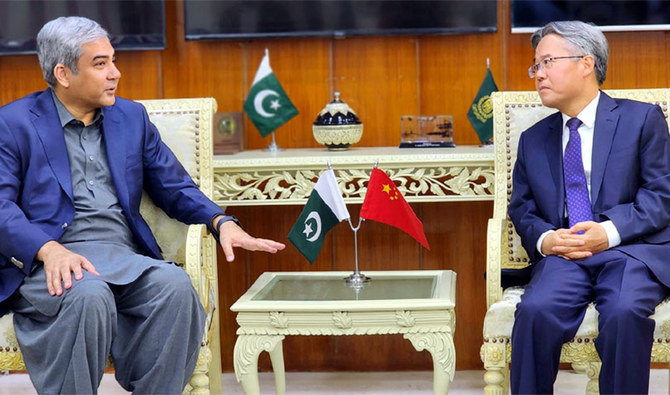
- Pakistan has recently witnessed surge in militant attacks on Chinese nationals
- A suicide attack in northwestern Pakistan in March killed five Chinese engineers
ISLAMABAD: Pakistan’s government will craft new standard operating procedures (SOPs) for the security of Chinese nationals working and living in the country, Interior Minister Mohsin Naqvi said on Thursday.
Pakistan has seen a rise in attacks on Chinese nationals in the country in recent months. A suicide bomber in March rammed his vehicle into a convoy of Chinese engineers working on a hydropower project in northwestern Pakistan. Five Chinese engineers were killed in the attack.
Pakistan has said it has since then taken steps to enhance the security of Chinese nationals in the country.
“Interior Minister Mohsin Naqvi says new Standard Operating Procedures (SOPs) related to the security of Chinese nationals will be crafted and it will be implemented in letter and spirit,” the state-run Radio Pakistan reported.
Naqvi was speaking to Chinese Ambassador to Pakistan Jiang Zaidong in Islamabad, the state media said, adding that he vowed to bring the perpetrators of the March attack to justice.
“Mohsin Naqvi said no conspiracy can sabotage the decades-old Pak-China friendship,” Radio Pakistan said.
Zaidong expressed satisfaction with the measures taken by Pakistani authorities for the security of Chinese nationals.
The Dasu attack was the third major one in a little over a week on China’s interests in the South Asian nation, where Beijing has invested over $65 billion in energy, infrastructure and other projects as part of its wider Belt and Road initiative.
Chinese interests in Pakistan’s southwestern Balochistan province have also been under attack primarily by militants who seek to push Beijing out of the mineral-rich territory.
Pakistan Navy hands over rescued Iranian fishermen to Tehran on humanitarian grounds
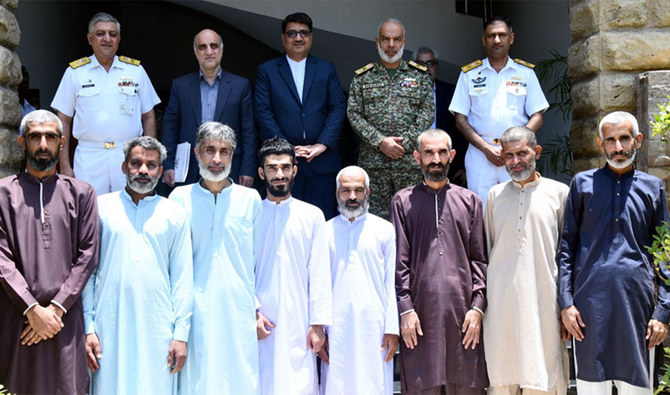
- Pakistan Navy ship Yarmook rescued eight Iranian fishermen in March after their ship caught fire in open sea
- Successful operation example of Pakistan Navy’s ability to deal with all kinds of situations, says army’s media wing
ISLAMABAD: Pakistan Navy on Thursday handed over eight Iranian fishermen it had rescued in an earlier operation to Iranian officials on humanitarian grounds, the military’s media wing said in a statement.
The rescue operation was conducted in March when a Pakistan Navy ship, Yarmook, heard a distress call from a fire-stricken boat in the open sea. Yarmook swiftly acted, the Pakistani military’s media wing said, adding that a successful rescue operation was carried out that saw all eight fishermen rescued and the fire extinguished.
“Pakistan Navy has handed over eight rescued Iranian fishermen to Iran’s diplomatic authorities,” the military’s media wing, the Inter-Services Public Relations (ISPR) said.
“The prompt and successful rescue operation is a practical example of Pakistan Navy’s ability to deal with all kinds of situations at sea.”
In February, the Pakistan Navy rescued nine Indian seamen who were stranded in a disabled tug en route to Sharjah.
The vessel, Ocean Tug SAS-5 registered at St. Kitts & Nevis, had been disabled for days near the Indian coast after a failure of its electric generators at a position 167 nautical miles southeast of the Pakistani port city of Karachi, according to Pakistan Navy.
Pakistan says will share concerns about terror groups threatening its security in ongoing US talks
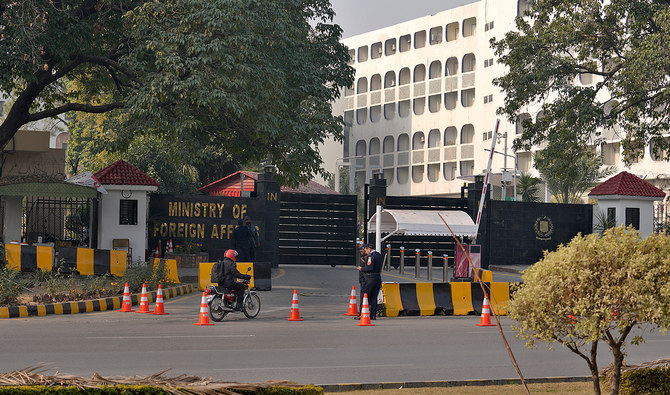
- Pakistan and United States are holding Pakistan-US Counterterrorism Dialogue in Washington
- Pakistan has said suicide attack that killed five Chinese workers in March was planned in Afghanistan
ISLAMABAD: The Pakistan Foreign Office said on Thursday Islamabad would share its concerns regarding terror groups that threatened its security with Washington as the two countries hold counterterrorism talks in the United States this week.
The three-day talks, which commenced on Wednesday and will conclude on May 10, are part of the Pakistan-US Counterterrorism Dialogue. The Pakistani delegation is led by the Additional Secretary United Nations division at the foreign ministry, Syed Haider Shah.
The initial round took place last year in Islamabad, where discussions centered on the counterterrorism landscape in Pakistan and the wider region.
“The counterterrorism talks between Pakistan and the United States are ongoing and the two sides will discuss issues related to security and countering violent extremism and combating terrorism financing,” foreign office spokesperson Mumtaz Zahra Baloch told reporters in a weekly briefing in Islamabad, saying terrorism posed a collective threat to the international community.
“It is important for Islamabad to share its concerns about terrorist groups that threaten its security with its interlocutors during these dialogues and this is a priority for Pakistan when we engage in these talks,” she added.
The FO statement comes two days after Pakistan’s military said a suicide bomb attack that killed five Chinese engineers was planned in neighboring Afghanistan, and that the bomber was also an Afghan national.
Relations between Pakistan and Afghanistan have soured in recent months as Islamabad says Kabul is not doing enough to tackle militant groups targeting Pakistan from across the border. Kabul says rising violence in Pakistan is a domestic issue for Islamabad and has denied allowing the use of its territory to militants.
Gaza
At Thursday’s press briefing, the Pakistan foreign office also condemned Israel’s attack on a Jordanian aid corps for humanitarian assistance to occupied Gaza.
“It is not just a flagrant violation of the obligations of the occupying power but a dangerous provocation that may lead to further escalation of tensions in the region,” Baloch said, condemning the invasion and seizure of the Rafah border crossing in southern Gaza by Israeli forces in what Islamabad said was defiance of international warnings and acceptable international behavior.
“With its latest actions, Israeli occupation authorities have once again demonstrated their contempt for international humanitarian law as they continue to pursue an abhorrent policy of genocide and extermination in Gaza,” Baloch added.
Pakistan-Saudi Arabia relations
Amid a flurry of visits between Pakistan and Saudi Arabia, including by the Saudi foreign minister and a high-powered business delegation to Islamabad and two visits by the Pakistani prime minister to Riyadh, the foreign office spokesperson said Pakistan and Saudi Arabia were engaged in a “robust dialogue” on cooperation in diverse domains, including in the energy sector.
“The two sides are also engaged in discussions for increased Saudi investments in Pakistan,” she added.
Baloch highlighted Pakistan’s emphasis on increased engagement, particularly with the Middle East, to attract foreign investment, saying the Special Investment Facilitation Council (SIFC) set up last year to oversee foreign financing was implementing measures to offer incentives to foreign investors in support of this effort.
Pak-Iran Gas pipeline
Baloch said the Iran-Pakistan (IP) gas pipeline was a “priority” for the country and reiterated that the South Asian nation would decide on the issue based on its own interest.
“Pakistan will take decisions based on its own national interest, and the Iran-Pakistan gas pipeline is a priority for Pakistan,” she added.
The two countries signed an agreement to construct the pipeline from Iran’s South Fars gas field to Pakistan’s Balochistan and Sindh provinces in 2010, but work on Pakistan’s portion has been held up due to fears of US sanctions.
In March, Islamabad said it would seek a US sanctions waiver for the pipeline. Washington, however, has said it does not support the project and cautioned about the risk of sanctions in doing business with Tehran.










